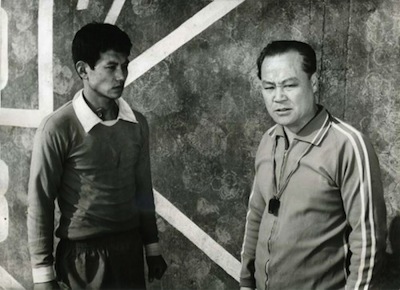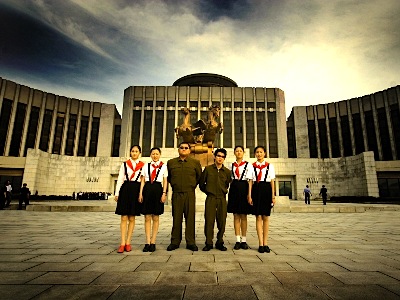By Joe Bendel. The “Fatherly Leader” loved the sight of young comrades physically exerting themselves in the open arena. Of course, the consequences of losing were rather permanent in “Juche” sports. Fortunately, Kim Il-sung also had ideas on cinema that prohibited any inconvenient realism. As a result, North Koreans had a steady diet of propaganda films, including Pak Chong-song’s oddly watchable Centre Forward, which screens at the 2011 Korean American Film Festival on a double bill with Mads Brügger’s reality check Red Chapel.
After several frustrating years as a scrub, Cha In-son finally gets a chance to start for the Taesongsan football team. Unfortunately, he is so keyed-up, he pretty much stinks up the field. Shortly thereafter, he and his entire family are consigned to a prison camp. The end. Actually, not in this sanitized portrayal of DPRK. Instead, Cha’s awful performance sets of a round of recriminations and self-criticism that would be out of place in any healthy society.

Basically, the Taesongsan coach decides his team lost because everyone got too fat and complacent, so he institutes a bone-crushing new training program, making Cha one popular fellow. He does not get much sympathy from his sister Myong-suk either, because as dancer in the elaborate propaganda productions staged on behalf of the Kim personality cult, she works harder than any of the football slackers.
Anyone waiting for a romance to blossom between Cha’s superstar roommate Chol-gyu and his sister Myong-suk better forget it. Centre is not merely chaste, it is neutered. There is only one person getting any love in this film, but he never appears directly. However, plenty of rousing songs are sung in Kim’s honor.
There is no question Centre is propaganda bearing little or no resemblance to the truth. Everyone is robustly vital and all the shops are amply stocked. Yet, it is bizarrely fascinating to watch this Rocky unfold with all its idiosyncrasies, while knowing it all takes place in one of the most isolated, repressive regimes in the world. At times, it is downright surreal, like the cut-away shots of the Taesongsan team suddenly riding a roller coaster in their Sunday best amidst their final training montage. (Aren’t they supposed to win the big game before going to Kim Il-sung-Land?) Still, the young actress playing Myong-suk is quite good, coming across as endearingly sweetly as she busts Cha’s chops for his insufficient zeal.
Although obviously stilted, a film like Centre is well worth screening if it is presented in the proper context. Fortunately, KAFFNY gives equal time to Mads Brügger’s Red Chapel, a bracing dose of truth. Ostensively Brügger came to North Korea with two Danish Korean comedians, Simon Jul Jørgensen and Jacob Nossell, to stage a good will show. However, his real intent was to expose the oppressive nature of DPRK system.
As soon as the Danes arrived in the North, their minder, Mrs. Pak, stuck to them like glue. Her response to Nossell was particularly unnerving, almost smothering the wheelchair-bound comedian with attention. However, even Mrs. Pak could not fake an enthusiastic response to the program the comedians had prepared. Featuring skits in drag and an unclassifiable rendition of Oasis’s “Wonderwall,” it was not just bad, it was awe-inspiringly awful.

While Chapel is at times a riotous exercise in comedic performance art, the overall film is as serious as a missile attack. The pathological nature of DPRK society weighed particularly heavily on Nossell (all too aware of the suspicious absence of North Koreans disabled in any way), causing frequent rifts between him and the director.
Though he makes a noble effort, Brügger fails to capture the smoking gun scene that would utterly lay bear North Korea’s tyranny. Of course, he was doomed from the start, because the Communists set all the rules and could change them at their convenience. Still, there are plenty of telling moments, as well as some truly outrageous humor. Indeed, Chapel compliments and counterbalances Centre quite effectively. Together they will make for a mind-blowing night of film this coming Saturday (3/19). However, the final word on the DPKR should go to John Arlotto’s poignant short film Deface, which also screens at this year’s KAFFNY.
[Editor’s Note: read LFM’s full review of Red Chapel from The LA Film Festival here.]